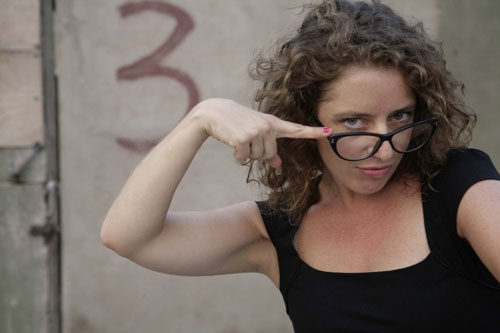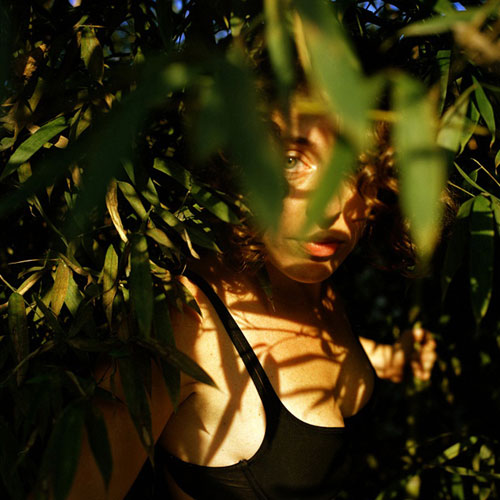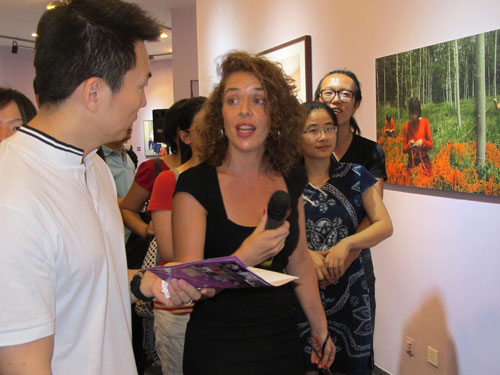 |
|
Many of Diana Coca's self-portraits reflect her experience as an actor or model - roles she says make her braver than she is in "real life". Photos Provided to China Daily |

 |
|
Top: In self-portraits such as City of Broken Dolls, Diana Coca emphasizes her shyness by partially hiding her eyes and face. Above: Coca at her current exhibition in Beijing. Mike Peters / China Daily |
Spanish photographer Diana Coca tells Mike Peters that she's been liberated by China's arts community.
|
Related:? |
She had felt on top of the world until last Saturday. A jury had chosen a photograph from her Extreme Nature series for an exhibition at the Cervantes Institute, and she was full of plans for the Beijing Design Week in September. And then the heavens opened. Extreme Nature had come to the capital in force. 24 hours later, the world of Spanish artist Diana Coca "looked like the Spanish Civil War". The little community of artists she works with in a cluster of seven greenhouses in Caochangdi village had been flooded out by the worst storm to hit China's capital in 61 years. Waterlogged sofas, computers, rugs, tables and canvases were toted outside, where a Johnny-come-lately sun beamed from a deep blue sky as if nothing had happened. By mid-afternoon, the courtyard and garden looked like a marketplace full of brightly colored goods.
Finding an opportunity - even odd beauty - in a difficult moment is nothing new for Coca, who joined her neighbors as they tossed the unusable, dried out the salvageable and rinsed off the merely muddy.
Like many expats, she has been inspired by China's energy and creative potential - and made the most of it since arriving a little more than a year ago.
"I was never supposed to be here," says the vivacious 35-year-old over lunch at a Yunnan cafe near her studio last week.
"But I believe in the power of chance. When you let chance happen, let chance touch you, amazing things can happen. Many people never follow that flow, and then they walk through life convinced that they are not as lucky as others."
Coca studied philosophy in her native Majorca, fascinated by such thinkers as Foucault, Nitsche, Freud and Spanish essayist Maria Zambrano.
But by the time she had her degree, she felt "the books were too far from real life". She had been earning money modeling for a series of male painters and photographers in Spain, and become obsessed with gender identity in general and "tired of being told what to do with my body by male figures" in particular.
Not for the first time, she thought of the strong, bright women in her family who had shelved ambitions to be museum directors and other professionals. A patriarchal culture in Spain had steered them instead to nursing and teaching - worthy occupations but not their own choice.
As she began to explore questions of female identity, she started taking self-portraits - and an artist was born. She set aside her degree in philosophy - but not the ideas it had given her - and was off to the UK to study art and photography in Brighton.
With a new degree in hand, she allowed a series of grants to sweep her to projects from New York to Mexico and then to Beijing's Three Shadows Photography Art Center.
"My work is still mainly self-portraits," she says. Because she is focused on the "objectification" of women - "and because I am actually shy by nature" - her images often do not show her face or her eyes.
In one image that's pure parody, only her bare legs in red heels appear, extending up into the moon door of a Chinese garden.
"In my art, I am looking not just for identity but for my place in the world," she says. "Sometimes the image is violent, sometimes I am falling, but I always get up again."
Coca's plans for her upcoming Beijing Design Week installation reflect that theme: "I'll have metal chains from the ceiling, like a curtain, with a lot of high heels to show the slavery of women in the commercial world, now even in China."
But her ideas and concerns now, she says, have evolved beyond female identity to the way society engulfs individuals. She's reading Aldous Huxley's Happy World after having read the novel Blade Runner, and she says humanity is walking to that society slowly.
"I can see Blade Runner when I go to cities like Hong Kong or London today, see the encroachment of cameras and the Internet into the lives of human beings." It's about control, she says: "Tools can control you if you don't control them."
Meanwhile, she's finding a lot of freedom in the art world, especially in China. That was something of a surprise, she says, because the Western media coverage of the creative scene in China tends to focus on dissident artists and their political problems.
"But I have never had a problem, for example, with a naked display in a public space. Today, China is more open-minded about art than Europe in this way - this can be a very good place to be an artist."
One challenge she shares with all expat artists: The temptation to zone in on the exotic side of China - just as foreigners in Spain fly like moths to flamenco and bullfights.
The China that creeps into her own art isn't a face from Peking Opera, Coca says. "It's a wall of corn on a roadside or a roof, or the red brick of a hutong the things that are familiar and comfortable to you if you live here, not what you know from passing through. I don't want my point of view to be the same as a travel guide.
Last year, she says, 40,000 young people left Spain because of the financial crisis. "If I had gone to Britain, I'd be one of the PIGS (a put-down term for economic refugees from Portugal, Italy, Greece and Spain) - from a poor country, seen as a burden on the rest of Europe, with a lot more pressure to prove my worth.
"Here, I have a good life without so much money, and I can get different kinds of creative work because Chinese people are very good about judging your talent by instinct."
She's a good actor despite being shy, she says, savoring roles as a prostitute and a Russian soldier in 1949 in dramas as well as smaller parts for TV and video commercials.
She has found bravery in her artistic persona ("I've eaten scorpions and all that, but not worms - NO!") and savors a down-to-earth lifestyle that includes yoga and sport, such as her beloved Spanish soccer team, and lots of creative projects.
"Here, my work stands or falls on its merits," she says. "That has helped me to reach a place where I can create a consistent body of work."
|
|
|
|
|
|
|
|
